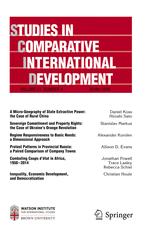Studies in Comparative International Development, v. 32, (1), 1997, SPR, p. 92-125
Zweig, David Stephen
ABSTRACT: This study, based on 273 face-to-face interviews with students, scholars, and former residents of China in the United States in 1993, uses both qualitative and quantitative methods to explain people’s views about returning to China. Although less than 9 percent of interviewees had concrete plans to return, over 32 percent were positively disposed to returning in the future. Key background variables that affect that decision are people’s age, sex, social background in China, and their views about returning when they first left China. Concern about children’s future was not significant, but having a wife abroad greatly increased the desire to stay abroad. Why people chose not to return varied significantly between people with children and those who didn’t. Even four years after the Tiananmen crackdown, concerns about political instability, lack of political freedom, and a lack of trust that the government would let people who returned leave again were significant reasons for not returning, But economic factors-better U.S. housing and incomes-as well as professional concerns about lack of job or career mobility in China and a poor work environment there were equally important. Given the weight attributed to economic factors and political stability, if China weathers Deng Xiaoping’s succession and the economy continues to grow, significant numbers of Chinese may return.
Links:
Studies in Comparative International Development, v. 32, (1), 1997, SPR, p. 92-125
Repository.ust.hk/ir/Record/1783.1-26530
Links:
Studies in Comparative International Development, v. 32, (1), 1997, SPR, p. 92-125
Repository.ust.hk/ir/Record/1783.1-76589



Leave A Comment